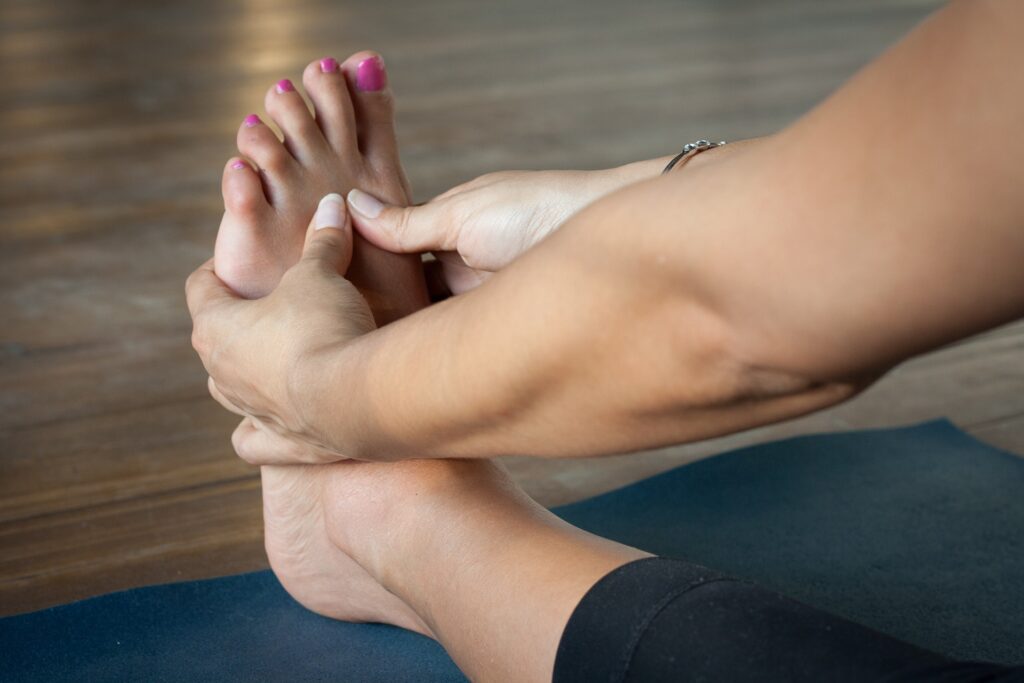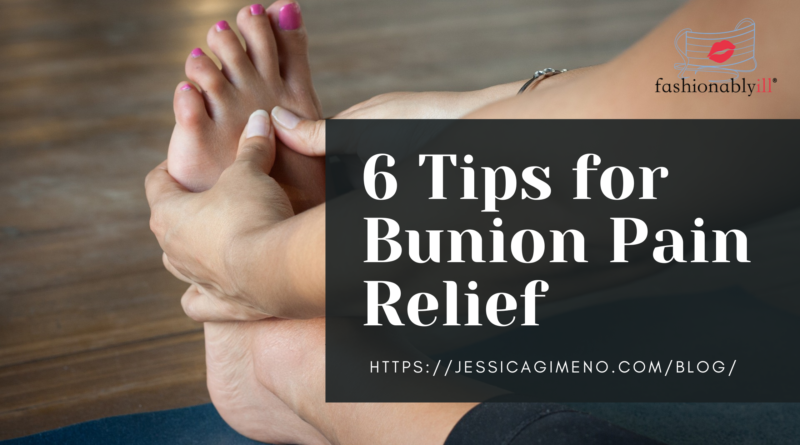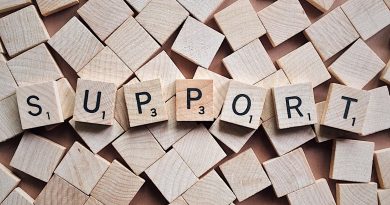6 Tips for Bunion Pain Relief
Let’s face it, everyone has different feet. We each vary in shoe size. Some have flat feet, while others have higher arches. Many people also live with the inconvenience of foot abnormalities like bunions.
What exactly is a bunion? How do they affect your life? Why are bunions painful? In this article we will explore bunions and bunion pain.

Bunions on Feet
A bunion, also referred to as hallux valgus, is often described as a bump on the side of the big toe. The visible bump reflects changes in the big toe joint and the big toe (hallux) will begin to deviate towards the second toe, rather than pointing straight ahead.
Foot Function
Bunions are a progressive foot deformity. As bunions grow bigger they can seriously affect how your foot works. You will experience redness, swelling, tenderness, and pain at the base of the big toe, and it can migrate to the ball of the foot. Also, because your big toe puts pressure on your other toes, this can potentially cause damage such as hammertoes or corns. You may also develop ingrown toenails and calluses on the bottom of the feet. Bunions can make your shoes very uncomfortable because they put pressure on the bunion.
A Change in Lifestyle
Bunions can cause you to live a very sedentary life. This is because something as simple as walking can cause you to have a lot of pain. Because of inactivity, you’re more likely to gain weight, and you are at greater risk of developing a chronic disease.
Quality of life can change drastically, and not for the better, because of bunions. Severe bunions can seriously interfere with the quality of life making simple chores, such as just going to the store, unpleasant.
Bunions and Other Health Concerns
Foot Arthritis
Having bunions can cause arthritis in your feet over time. Because the joint in your big toe is out of alignment, the friction on your bones is unusual, damaging the cartilage. When the cartilage wears thin or wears away completely, bone-on-bone pain results in stiffness and inflammation associated with arthritis.
Gait Dysfunction
Your big toe is small and may not seem all that important. However, it’s your big toe that helps you with your balance and the proper gait. As a bunion grows, it begins to affect how your feet hit the ground and how you distribute your weight.
Cause Knee and Back Pain
Since your bunion pain can change your gait, your knees and back are the first to notice, and they, in turn, make a change. The extra stress on those joints causes pain in your joints and overall fatigue. Like all these other health concerns, knee and back pain shouldn’t stop you from walking in style.
Damage Other Toes
Because of your bunion, toes can become crowded and cramped in your shoes, leading to corns, blisters, and hammertoes.
Bunion Pain
Bunion pain can be life altering and no fun. Here are six ways to help relieve your bunion pain.
- Wear wide shoes
- Get the best arch support in your shoes
- Do not wear slippers at home, but instead wear sandals with arch support
- Wear socks designed to reduce friction and add cushion
- Use a toe separator
- Consider surgery to permanently fix your bunion
Wear wide, soft or mesh shoes
When you have bunions, comfortable shoes may be a challenge to find. Many shoes will push against the bunion causing pain or even cause redness, swelling and/or blistering. Avoid shoes that are too short, tight, or sharply pointed, and those with heels higher than a couple of inches. When buying your next pair of shoes, go to a shoe store with well trained shoe fitters to size your feet. A trained shoe fitter will not only lead you to the best fitting shoes, but can often modify the shoe for difficult-to-fit feet.
Get the best arch support in your shoes
Good arch support will transfer force away from the bunion. A pre-made orthotic would also be helpful to this situation. However, a custom orthotic would be the best and the most effective. If you want to save a few dollars and go the store-bought route, look for Powerstep or Superfeet brands. These two companies are the industry standard for quality over-the-counter orthotics.
Do not wear slippers at home and wear sandals with arch support instead
Slippers can be comfy footwear around home. But all of your shoes, including your house shoes, need good arch support. Narrow house slippers can push the big toe inward, causing further friction in the bunion area. Arch support can also reduce pressure on the bunion.
Wear socks designed to reduce friction and add cushion
Cotton socks are not a good option because they cause a higher amount of friction. You should also avoid socks with seams across the toes. These can cause friction and pain in the bunion area. Seamless socks should be considered. Socks can be made with a combination of wool and spandex. Compression socks also help avoid friction. However, If you are a diabetic, you should avoid compression socks because you don’t want to restrict blood flow to your feet.
Use a toe separator
Using a toe separator between your first and second toes will prevent them from rubbing together and overlapping. Toe separators are most effective when they are used in the early stages of bunions, before the big toe becomes more fixed in its position. While this won’t reverse or heal your bunion, it may help straighten your toe joint while wearing it. Some feel immediate pain relief.
Consider surgery to permanently fix your bunion
Bunion surgery is also an option. If you’ve had bunion pain for years and it begins to truly alter your life and activities, maybe it’s time to explore professional treatments and surgery. Foot and Ankle Specialists of Illinois specializes in foot surgerys, pain and deformities, and several other conditions. Not all podiatrists specialize in bunions, so make sure your podiatrist is highly experienced in this area. Ideally, you know someone who has had bunion surgery and they’ll be able to refer you to a qualified podiatrist.
Understanding bunion pain, and treating it sooner rather than later could put off the need for surgery. If you or someone you love has a bunion, these guidelines should get you on the right track to reduce your pain.
Katie Meyers is an SEO Specialist at SEO Design Chicago. Before joining the SEO Design Chicago team, she interned for them, as well as interned as a Content Writer at HZD Creates. Katie is from Washington State and has an AA and a Social Media Marketing Certificate.





